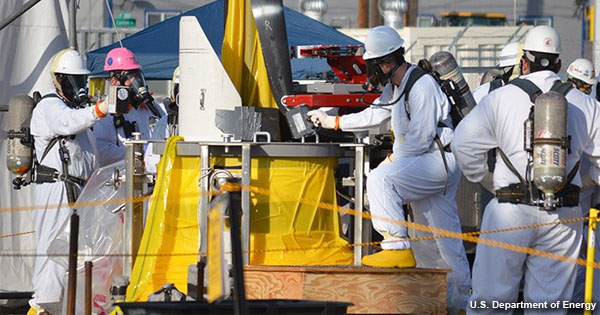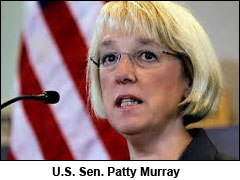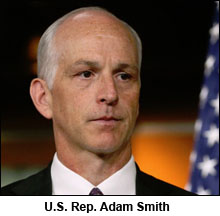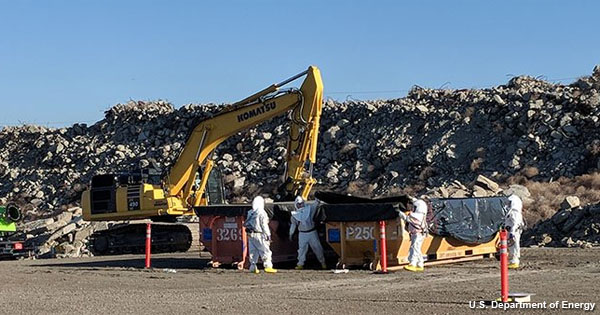NATIONAL
Sen. Murray, Rep. Smith fight for Hanford workers
Legislation would ease benefits for nuclear cleanup workers if they get sick
WASHINGTON, D.C. (March 26, 2021) — Sen. Patty Murray (D-Wash.) and Rep. Adam Smith (D-WA, 9th) are once again leading the charge to ensure cleanup workers at Hanford Nuclear Reservation and other Department of Energy environmental management sites can more easily claim workers’ compensation benefits when they suffer medical conditions as a result of exposure to toxic substances. The Toxic Exposure Safety Act was reintroduced Thursday by Murray, who chairs the Senate health and labor committee, and Sen. Joe Manchin (D-W.V.), who chairs of the Senate energy committee. Rep. Adam Smith (D-Wash., 9th) is introducing companion legislation in the U.S. House of Representatives.

Currently, Hanford workers can file for workers’ compensation claims when they have health issues through both the Washington State Department of Labor and Industries (L&I) and the DOE’s third-party insurer, Penser. Washington state’s 2018 presumption law makes it easier for Hanford workers to file for state compensation claims for covered conditions, but the state program, while valuable, often falls short of being able to compensate these workers equitably when they are off the job from work-related illness due to toxic exposure. The Toxic Exposure Safety Act seeks to make such claims at the federal level more achievable, and allow Hanford workers and workers at similar DOE sites to collect the full workers’ compensation benefits they’re entitled to.
 “There is too much we don’t know when it comes to the health outcomes of exposure to the toxic substances required for plutonium production and other activities at nuclear sites that workers at Hanford go through every day,” Murray said. “This legislation takes the right steps to help fix this knowledge gap and ensure Hanford workers and those at other nuclear clean-up sites can obtain the full benefits they’re entitled to when they’ve contracted illnesses as a result of workplace exposure. As a voice for Hanford workers in the Senate, I will be working to pass this legislation and get them the support and assistance they deserve.”
“There is too much we don’t know when it comes to the health outcomes of exposure to the toxic substances required for plutonium production and other activities at nuclear sites that workers at Hanford go through every day,” Murray said. “This legislation takes the right steps to help fix this knowledge gap and ensure Hanford workers and those at other nuclear clean-up sites can obtain the full benefits they’re entitled to when they’ve contracted illnesses as a result of workplace exposure. As a voice for Hanford workers in the Senate, I will be working to pass this legislation and get them the support and assistance they deserve.”
 “There is still a lot to learn regarding the long-term impacts of working nuclear cleanup sites such as Hanford, but it is clear there are certain risks to the health and wellbeing of workers,” Smith said. “There is an absence of research focused on these impacts and unfortunately, when workers develop medical illness as a result of exposure to toxic substances, they struggle to receive benefits under federal law in many instances to address their ailments. The Toxic Exposure Safety Act would facilitate the research necessary to understand the impacts of toxic substance exposure on workers’ health so they can rightfully receive the compensation they deserve for illnesses contracted on the job. I appreciate Senator Murray sharing my concerns – I thank her for her leadership in fighting for Hanford workers and I am proud to join her and Senator Manchin on this important bill.”
“There is still a lot to learn regarding the long-term impacts of working nuclear cleanup sites such as Hanford, but it is clear there are certain risks to the health and wellbeing of workers,” Smith said. “There is an absence of research focused on these impacts and unfortunately, when workers develop medical illness as a result of exposure to toxic substances, they struggle to receive benefits under federal law in many instances to address their ailments. The Toxic Exposure Safety Act would facilitate the research necessary to understand the impacts of toxic substance exposure on workers’ health so they can rightfully receive the compensation they deserve for illnesses contracted on the job. I appreciate Senator Murray sharing my concerns – I thank her for her leadership in fighting for Hanford workers and I am proud to join her and Senator Manchin on this important bill.”
Murray and Smith originally introduced the Toxic Exposure Safety Act in July 2020 after the Seattle Times ran an investigative story profiling Bill Evans Jr., a worker who suffered from seizures after being exposed to toxic substances at the Plutonium Finishing Plant on the Hanford site, as well as the financial problems the worker encountered following their diagnosis.
Nickolas Bumpaous of UA Local 598, who serves as president of the Central Washington Building and Construction Trades Council, was instrumental in advocating for Washington’s 2018 presumption law and strongly supports this renewed effort at the federal level.
“Every day our nation relies on skilled and dedicated working families to serves our country’s needs and accomplish our most important goals,” Bumpaous said. “There is no more apparent example of this dedication than the decades of operation and remediation performed at our nation’s nuclear cleanup sites. The hazardous nature of this work has the potential to expose workers to some of the most toxic substances on Earth. Too long have the impacts of these toxic substance exposures been overlooked and their study underfunded, leaving many hardworking American families without the care they deserve. Senator Murray’s efforts address this injustice for so many families struggling with illness and will secure the research needed to protect American families as they continue their work on behalf of us all.”

The Toxic Exposure Safety Act would expand covered employees and the covered illnesses under subtitle E, Section 3671 of the Energy Employees Occupational Illness Compensation Program Act of 2000 (EEOICPA) to specifically include employees exposed to toxic substances at cleanup sites. Part E provides variable cash and medical benefits for DOE contractor and subcontractor employees who contracted an illness or died as a result of exposure to any toxic substance, as well as their eligible survivors. A person is eligible for Part E benefits if it is “at least as likely as not” that exposure to a toxic substance at a DOE facility caused, contributed to, or aggravated the worker’s illness or death.
There has been a lack of substantial clinical or epidemiological studies performed in relation to toxic exposures at DOE sites, and as such, there is no way to create an accurate causal correlation for Part E, similar to what has been effectively established for Part B of the program, which involves radiological exposures. As a result of the lack of this knowledge, federal law provides very little remedy to workers who suffer illness from these toxic exposures. To that end, the Toxic Exposure Safety Act would amend Part E of the EEOICPA to establish a presumption of occupational disease exposures, create a research program to determine exposure-disease correlation, and direct the National Academy of Sciences to evaluate scientific evidence regarding chemical exposures—making it easier for Hanford clean-up workers and workers at other DOE nuclear clean-up sites to claim federal worker’s compensation benefits.
In addition to UA 598 and the BCTC, the legislation is also supported by the Hanford Atomic Metal Trades Council, the Alliance of Nuclear Worker Advocacy Groups, and Cold War Patriots.






